
Africa [credit: Mapswire.com]
Africa is a nascent innovation powerhouse, and its leadership will become increasingly obvious during the coming decades, but the seeds are already visible as this post reveals: Africa’s population is exploding, and its young people are adopting tech alternatives to countries’ long-insufficient health, education, and financial infrastructure.
If you’ve been interested in international development for long, you have seen many prognostications about “Africa rising” over the years only to see them fade into oblivion. Predicting profound economic shifts is like predicting earthquakes; you study the driving forces and your algorithms crunch the data.
That isn’t stopping Helga Stegmann. She has led “user experience” agency Mantaray since 2006, and she gave a riveting talk last week in Chicago hosted by partner agency BoldInsight. In my experience, user experience folks rarely have their hands on the pulse of disruptive economic change, but the reason she is an exception reflects that Africa’s economic transformation is happening at the grassroots level (as with most revolutions), and her key orientation is user experience design, so researching users across rapidly evolving interfaces in devices. Follow along with my notes of her remarks […]
 Technologies Enabling the Police State describes the inevitability of pervasive surveillance, how it’s developing, and how we can act now to maintain the maximum degree of freedom. This is Part1 of a series on autonomy in the digital age. Personal and Collective Actions to Maintain Autonomy (Part2) is a how-to post, while Police State Scenarios (Part3) discusses ways that collective permanent loss of autonomy could unfold. Technologies Enabling the Police State describes the inevitability of pervasive surveillance, how it’s developing, and how we can act now to maintain the maximum degree of freedom. This is Part1 of a series on autonomy in the digital age. Personal and Collective Actions to Maintain Autonomy (Part2) is a how-to post, while Police State Scenarios (Part3) discusses ways that collective permanent loss of autonomy could unfold.
Despite their grim titles, these posts are not intended as doomsday writings, and I don’t intend to say that I think a police state is being developed intentionally. My conclusion is rather that the technologies of mass control are developing rapidly, and the risk is significant that some group will seize control of them in the foreseeable future. I think you’ll find some of their points surprising, perhaps even breakthrough. Please let me know in comments!
I did not want to write this post, and I doubt that you want to read it; however, as I explain here, we’re at a pivotal point of human history. We are rapidly losing our […]

Ron May, 1956-2013
Ron May Digital Social Pioneer, and the notorious Chicago hightech commentator and analyst, died on 23 June 2013. Since I knew Ron longer and better than many people, I’ll reflect on what I knew of his life and considerable gifts and contributions. Above all, I’ll try to convey what Ron taught me about the digital world, where he was a pioneer among pioneers.
I met Ron in late 1996 in Dick Reck’s office at KPMG, when The May Report was fledging. It was obvious that he was unusually smart and passionate and motivated, and I learned that these traits were the foundation of Ron May the person. Ron May cared, and he had strong opinions. He had a brilliant inquisitive mind and indefatigable energy. I had a few conversations with Ron about his health over the years, and I suspect that it had a large impact on how he felt and interacted in public.
[…]
Empowered customers and omni-channel commerce are mirrors of each other, and both are transforming “retail.”
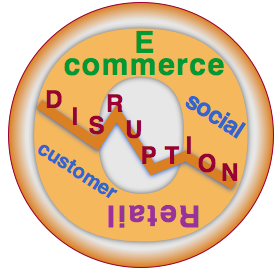 [UPDATED] Connected customers have the Internet in their pockets and use mobile and other devices in all stages of conceptualizing, considering, evaluating, buying and using purchased products and services. These customers want to interact with firms and brands in a seamless experience that features single sign-on as an entry point; they want the firm to respond using their individual data when that makes interacting more valuable. Omni-channel commerce refers to a collection of technologies, practices and strategies firms use to provide the personal individualized experience that connected customers expect. [UPDATED] Connected customers have the Internet in their pockets and use mobile and other devices in all stages of conceptualizing, considering, evaluating, buying and using purchased products and services. These customers want to interact with firms and brands in a seamless experience that features single sign-on as an entry point; they want the firm to respond using their individual data when that makes interacting more valuable. Omni-channel commerce refers to a collection of technologies, practices and strategies firms use to provide the personal individualized experience that connected customers expect.
IBM’s 2012 study of retail customers in eight mature economies (Australia, Canada, France, Italy, Japan, Spain, the UK and the USA) and seven growth economies (Argentina, Brazil, Chile, China, Colombia, Mexico and South Africa) lays bare that the retail “shopping” experience has shifted profoundly, although you wouldn’t know it by looking at most offline or online retailers’ presences. The paper, “Winning over the empowered consumer: Why trust matters,” is a call to […]
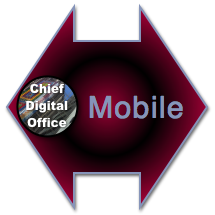 Ubiquitous Computing Primer reveals mobile’s ultimate business context and enables astute digital executives to create a whole new layer of value from their mobile investments. “Mobile” is far more important than launching smartphone and tablet apps because “smart” devices will interact with each other to provide a new level of capability and customer experience. This primer is a very brief treatment of a complex subject, so follow its links to drill down. Ubiquitous Computing Primer reveals mobile’s ultimate business context and enables astute digital executives to create a whole new layer of value from their mobile investments. “Mobile” is far more important than launching smartphone and tablet apps because “smart” devices will interact with each other to provide a new level of capability and customer experience. This primer is a very brief treatment of a complex subject, so follow its links to drill down.
In 2013, smartphones and tablets imply that people are interacting with each other and “the Internet,” but “mobile” is becoming a “feature” of all kinds of devices and products in a phenomenon called “ubiquitous computing.”
Ubiquitous Computing Primer is Part1 of The CDO Guide to Mobile for Digital Transformation.
[…]
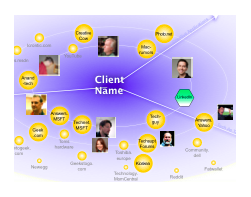 The Digital Social Ecosystem Audit shows you where to interact to produce the best outcomes at the minimal cost, so it is critical to social business initiatives. CSRA launched its “Ecosystem Audit” process in 2008, and we’ve conducted them for many businesses and brands, which get to know the digital world around them in an unprecedented way. Think of the ecosystem audit as an xray of the social ecosystem. Try operating without it ;^) – but most firms do! The Digital Social Ecosystem Audit shows you where to interact to produce the best outcomes at the minimal cost, so it is critical to social business initiatives. CSRA launched its “Ecosystem Audit” process in 2008, and we’ve conducted them for many businesses and brands, which get to know the digital world around them in an unprecedented way. Think of the ecosystem audit as an xray of the social ecosystem. Try operating without it ;^) – but most firms do!
Here I’ll offer my insights into client outcomes as well as how we’ve evolved the process and why. You will get some practical pointers about how you can do your own.
[…]
How Marketers Are Pushing the Wrong Button on Mobile

Mobile advertising is flawed because it interrupts. CMOs’ continued use of such outmoded marketing tactics isn’t pretty, like bursting market bubbles or parties at which one has stayed too long. Screen-hogging banners or tricky apps are unnecessary for those who understand the mobile experience and how to add value; however, they are very effective for alienating clients and customers. As Stan Rapp puts it, “Don’t do things to people (do things with them).” In the interest of doing mobile right, I’ll juxtapose the mobile experience with advertising to show how inappropriate much of it is before suggesting how marketers and brands can add value and avoid destroying trust.
“Everybody hates digital ads.” This is a refrain I’ve heard forever, and I have never heard anyone say that they like them. People don’t even like big screen […]
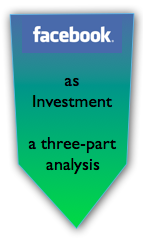 Facebook As Investment: No Replacement for Facebook But Pureplays Will Fade shows how the fading importance of social networks is the threat—not competitors. In Part One of the Facebook As Investment trilogy, I argued that Facebook had a signifiant trust gap with users that would inhibit its ability to monetize its most unique and valuable assets, and that the trust gap was recently compounded by its “IPO irregularities.” In Part Two, I’ll take a different tack and analyze the investment prospects of Facebook-the-platform. Part Three advises executives on how to isolate their social business investments from Facebook business risks. Facebook As Investment: No Replacement for Facebook But Pureplays Will Fade shows how the fading importance of social networks is the threat—not competitors. In Part One of the Facebook As Investment trilogy, I argued that Facebook had a signifiant trust gap with users that would inhibit its ability to monetize its most unique and valuable assets, and that the trust gap was recently compounded by its “IPO irregularities.” In Part Two, I’ll take a different tack and analyze the investment prospects of Facebook-the-platform. Part Three advises executives on how to isolate their social business investments from Facebook business risks.
In its favor, Facebook will not have to worry about being “displaced” by another social network the way that it displaced MySpace. In the near term, this lack of competition will give the company some breathing room. However, a more daunting threat awaits, the end of the social network pureplay, but that is 3-5 years out.
Nonetheless, the fate of pureplays should be top-of-mind for serious Facebook investors: to produce the fabulous returns that […]
Review: South by Southwest Interactive 2011 takes you behind the curtain of the famous confab and suggests why you might want to attend
 I had never attended SXSW before because I always had other things happening, and the value proposition was never obvious to me. In general, I attend very few “social media” conferences as the hype usually exceeds the delivery in an “industry” that’s particularly prone to self-congratulation. This year, a client launched a new venture at SXSW, so I decided to stay a couple of days afterward to see what the noise was about. Here are my informal impressions that I hope will be useful to you in deciding whether it might be worthwhile for you to attend. I invite your comments and impressions, too. I had never attended SXSW before because I always had other things happening, and the value proposition was never obvious to me. In general, I attend very few “social media” conferences as the hype usually exceeds the delivery in an “industry” that’s particularly prone to self-congratulation. This year, a client launched a new venture at SXSW, so I decided to stay a couple of days afterward to see what the noise was about. Here are my informal impressions that I hope will be useful to you in deciding whether it might be worthwhile for you to attend. I invite your comments and impressions, too.
[Update: links to additional coverage below: Gowalla, TOMS, LinkedIn execs]
[…]
Curmudgeonly Looking into the Past to Divine the Future—That Nagging Privacy Issue—Debunking the Elephant
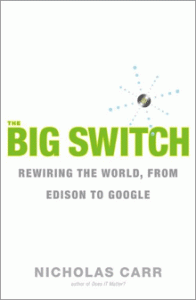 The Big Switch is a valuable book that reflects what has become Nick Carr’s trademark role, heckling IT and Web enthusiasts, albeit from good seats. Carr seems to relish his role as “the fly in the ointment” of the idealistic IT-enabled world that Web missionaries espouse. Although this book has shortcomings, I recommend it for two reasons. First, Carr makes a convincing and useful argument that the “electrification” of business and society (the Edison part) has valuable lessons for the “computerization” transformation of business and society (the Google part) that is currently unfolding. This parallel provides context to think about some of the disruptions around your business, society and career. Second, Carr raises serious questions about possible privacy implications of computerization. He palpably weighs in on the dark side and seems to want the world to change course from the “googlization of life.” If you haven’t read The Long Tail, I would read these books in proximity because they are very complementary and both quick, important reads. The Big Switch is a valuable book that reflects what has become Nick Carr’s trademark role, heckling IT and Web enthusiasts, albeit from good seats. Carr seems to relish his role as “the fly in the ointment” of the idealistic IT-enabled world that Web missionaries espouse. Although this book has shortcomings, I recommend it for two reasons. First, Carr makes a convincing and useful argument that the “electrification” of business and society (the Edison part) has valuable lessons for the “computerization” transformation of business and society (the Google part) that is currently unfolding. This parallel provides context to think about some of the disruptions around your business, society and career. Second, Carr raises serious questions about possible privacy implications of computerization. He palpably weighs in on the dark side and seems to want the world to change course from the “googlization of life.” If you haven’t read The Long Tail, I would read these books in proximity because they are very complementary and both quick, important reads.
As […]
|
|


 Technologies Enabling the Police State describes the inevitability of pervasive surveillance, how it’s developing, and how we can act now to maintain the maximum degree of freedom. This is Part1 of a series on autonomy in the digital age. Personal and Collective Actions to Maintain Autonomy (Part2) is a how-to post, while Police State Scenarios (Part3) discusses ways that collective permanent loss of autonomy could unfold.
Technologies Enabling the Police State describes the inevitability of pervasive surveillance, how it’s developing, and how we can act now to maintain the maximum degree of freedom. This is Part1 of a series on autonomy in the digital age. Personal and Collective Actions to Maintain Autonomy (Part2) is a how-to post, while Police State Scenarios (Part3) discusses ways that collective permanent loss of autonomy could unfold.
 [UPDATED] Connected customers have the Internet in their pockets and use mobile and other devices in all stages of conceptualizing, considering, evaluating, buying and using purchased products and services. These customers want to interact with firms and brands in a seamless experience that features single sign-on as an entry point; they want the firm to respond using their individual data when that makes interacting more valuable. Omni-channel commerce refers to a collection of technologies, practices and strategies firms use to provide the personal individualized experience that connected customers expect.
[UPDATED] Connected customers have the Internet in their pockets and use mobile and other devices in all stages of conceptualizing, considering, evaluating, buying and using purchased products and services. These customers want to interact with firms and brands in a seamless experience that features single sign-on as an entry point; they want the firm to respond using their individual data when that makes interacting more valuable. Omni-channel commerce refers to a collection of technologies, practices and strategies firms use to provide the personal individualized experience that connected customers expect. Ubiquitous Computing Primer reveals mobile’s ultimate business context and enables astute digital executives to create a whole new layer of value from their mobile investments. “Mobile” is far more important than launching smartphone and tablet apps because “smart” devices will interact with each other to provide a new level of capability and customer experience. This primer is a very brief treatment of a complex subject, so follow its links to drill down.
Ubiquitous Computing Primer reveals mobile’s ultimate business context and enables astute digital executives to create a whole new layer of value from their mobile investments. “Mobile” is far more important than launching smartphone and tablet apps because “smart” devices will interact with each other to provide a new level of capability and customer experience. This primer is a very brief treatment of a complex subject, so follow its links to drill down. The Digital Social Ecosystem Audit shows you where to interact to produce the best outcomes at the minimal cost, so it is critical to social business initiatives. CSRA launched its “Ecosystem Audit” process in 2008, and we’ve conducted them for many businesses and brands, which get to know the digital world around them in an unprecedented way. Think of the ecosystem audit as an xray of the social ecosystem. Try operating without it ;^) – but most firms do!
The Digital Social Ecosystem Audit shows you where to interact to produce the best outcomes at the minimal cost, so it is critical to social business initiatives. CSRA launched its “Ecosystem Audit” process in 2008, and we’ve conducted them for many businesses and brands, which get to know the digital world around them in an unprecedented way. Think of the ecosystem audit as an xray of the social ecosystem. Try operating without it ;^) – but most firms do!
 Facebook As Investment: No Replacement for Facebook But Pureplays Will Fade shows how the fading importance of social networks is the threat—not competitors. In Part One of the Facebook As Investment trilogy, I argued that Facebook had a signifiant trust gap with users that would inhibit its ability to monetize its most unique and valuable assets, and that the trust gap was recently compounded by its “IPO irregularities.” In Part Two, I’ll take a different tack and analyze the investment prospects of Facebook-the-platform. Part Three advises executives on how to isolate their social business investments from Facebook business risks.
Facebook As Investment: No Replacement for Facebook But Pureplays Will Fade shows how the fading importance of social networks is the threat—not competitors. In Part One of the Facebook As Investment trilogy, I argued that Facebook had a signifiant trust gap with users that would inhibit its ability to monetize its most unique and valuable assets, and that the trust gap was recently compounded by its “IPO irregularities.” In Part Two, I’ll take a different tack and analyze the investment prospects of Facebook-the-platform. Part Three advises executives on how to isolate their social business investments from Facebook business risks. I had never attended SXSW before because I always had other things happening, and the value proposition was never obvious to me. In general, I attend very few “social media” conferences as the hype usually exceeds the delivery in an “industry” that’s particularly prone to self-congratulation. This year, a client launched a new venture at SXSW, so I decided to stay a couple of days afterward to see what the noise was about. Here are my informal impressions that I hope will be useful to you in deciding whether it might be worthwhile for you to attend. I invite your comments and impressions, too.
I had never attended SXSW before because I always had other things happening, and the value proposition was never obvious to me. In general, I attend very few “social media” conferences as the hype usually exceeds the delivery in an “industry” that’s particularly prone to self-congratulation. This year, a client launched a new venture at SXSW, so I decided to stay a couple of days afterward to see what the noise was about. Here are my informal impressions that I hope will be useful to you in deciding whether it might be worthwhile for you to attend. I invite your comments and impressions, too. The Big Switch is a valuable book that reflects what has become Nick Carr’s trademark role, heckling IT and Web enthusiasts, albeit from good seats. Carr seems to relish his role as “the fly in the ointment” of the idealistic IT-enabled world that Web missionaries espouse. Although this book has shortcomings, I recommend it for two reasons. First, Carr makes a convincing and useful argument that the “electrification” of business and society (the Edison part) has valuable lessons for the “computerization” transformation of business and society (the Google part) that is currently unfolding. This parallel provides context to think about some of the disruptions around your business, society and career. Second, Carr raises serious questions about possible privacy implications of computerization. He palpably weighs in on the dark side and seems to want the world to change course from the “googlization of life.” If you haven’t read The Long Tail, I would read these books in proximity because they are very complementary and both quick, important reads.
The Big Switch is a valuable book that reflects what has become Nick Carr’s trademark role, heckling IT and Web enthusiasts, albeit from good seats. Carr seems to relish his role as “the fly in the ointment” of the idealistic IT-enabled world that Web missionaries espouse. Although this book has shortcomings, I recommend it for two reasons. First, Carr makes a convincing and useful argument that the “electrification” of business and society (the Edison part) has valuable lessons for the “computerization” transformation of business and society (the Google part) that is currently unfolding. This parallel provides context to think about some of the disruptions around your business, society and career. Second, Carr raises serious questions about possible privacy implications of computerization. He palpably weighs in on the dark side and seems to want the world to change course from the “googlization of life.” If you haven’t read The Long Tail, I would read these books in proximity because they are very complementary and both quick, important reads.